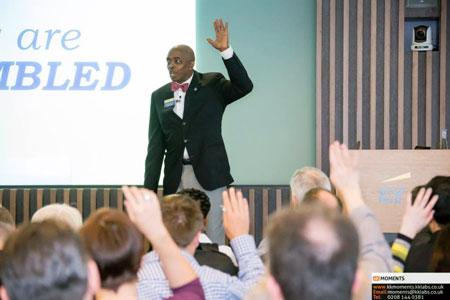 Some time ago, I received an e-mail in which a Toastmaster asked me ‘HOW MUCH emotion should be expressed in a speech?” Immediately, my mind ran in rewind to the finals of the 2010 Toastmasters International Speech Contest. That day, David Henderson delivered a stirring speech, and he openly expressed deep emotion during his presentation. The audience was moved and there was little surprise when he was named the World Champion of Public Speaking. To be honest, I wouldn’t be surprised if someone told me that the fact that David CRIED during his presentation, was a hot topic of conversation for many who were in attendance that day. Now I must confess that I’ve been attending speech contests, at every level of the competition, for 2 decades, and I don’t recall ever seeing such a powerful display of emotion before. It was quite remarkable, and the concept of emotional content is worth exploring. Well, here’s my take on this issue…and remember this is just my opinion, based on more than 20 years on the platform.
Some time ago, I received an e-mail in which a Toastmaster asked me ‘HOW MUCH emotion should be expressed in a speech?” Immediately, my mind ran in rewind to the finals of the 2010 Toastmasters International Speech Contest. That day, David Henderson delivered a stirring speech, and he openly expressed deep emotion during his presentation. The audience was moved and there was little surprise when he was named the World Champion of Public Speaking. To be honest, I wouldn’t be surprised if someone told me that the fact that David CRIED during his presentation, was a hot topic of conversation for many who were in attendance that day. Now I must confess that I’ve been attending speech contests, at every level of the competition, for 2 decades, and I don’t recall ever seeing such a powerful display of emotion before. It was quite remarkable, and the concept of emotional content is worth exploring. Well, here’s my take on this issue…and remember this is just my opinion, based on more than 20 years on the platform.
Emotions come into play in every speech, whether we notice them or not, so first, we have to identify them. Dr. Paul Elkman, an American psychologist and a pioneer in the field of human emotion, identified 6 universal emotions: happiness, sadness, anger, fear, surprise and disgust. Every speech, every FAMOUS speech, connects the audience with at least ONE of those emotions. We then have to look at 2 dimensions of emotion, as it relates to a speech or presentation: There is the emotion that the audience experiences, and the emotion that the presenter displays.
Let’s take a look at emotion from the perspective of the audience. It’s likely that you’ve heard me teach about storytelling at some point. If so, you will note that I constantly encourage presenters to ask themselves a key question when preparing your presentation: “What do I want the audience to think, feel or do after hearing my speech?” The question itself assumes that there is an emotional component contained in the intent of your speech. FEEL. What do you want your audience to FEEL. Now it is widely held that speeches serve one or more of four purposes: to INFORM, PERSUADE, ENTERTAIN, and INSPIRE. All of these types of speeches can elicit audience emotion.
An informative speech about changes within an organization can generate myriad emotions. If you are a Toastmaster, think about how people responded to the organizations rebranding in 2011. The members Facebook page was abuzz with emotional, sometimes caustic comments, both for and against. An even greater outpouring of emotion followed the rebranding of the National Speakers Association in July 2014. The members thought, they felt, and they DID. The outcry was so powerful that the NSA Leadership decided to MOVE AWAY from their proposed rebranded name, with a decision to be made at a later time. It is clear from tweets, blog posts, and information on other social media, that the members experienced at least four of the six universal emotions; ANGER, SURPRISE, HAPPINESS, and SADNESS. That was a a few years ago, and the NSA STILL has not moved forward with re-branding. If you wish to do more research on this, a simple Google search will yield a plethora of results.
Persuasive speeches often appeal to the intellect, but fundraising speeches certainly have emotional appeal. Requests to help charitable organizations to care for the poor and malnourished may elicit DISGUST and ANGER, while a speech seeking support for a children’s hospital or other medical facilities can invoke SADNESS. Speeches in support of social causes can result in SURPRISE, FEAR, SADNESS, DISGUST and ANGER…depending on the issue.
Inspirational speeches can invoke SADNESS, SURPRISE or even DISGUST, prompting the audience to take some form of action.
Entertaining speeches often can provide a mixture of emotions that could include SADNESS, and almost always result in HAPPINESS.
Think about a speech that you heard recently, regardless of the type of speech, and try to recall the emotions you felt after hearing it. Chances are, you experienced more than one of the 6 universal emotions.

David Henderson, 2010 World Champion of Public Speaking
Now let’s briefly examine this from the speaker’s perspective. One question worth considering centers around how MUCH emotion a speaker displays on the platform. That’s why I mentioned David Henderson. In an interview with Toastmasters, David explains his propensity for tears in this way:
“I have a habit of tearing up when I’m giving speeches. And so I told myself ‘I need to get over this and learn how not to cry when I’m giving speeches! And then after I was in Toastmasters for a while I realized, that’s not gonna happen! But then the challenge was…if I can’t make myself stop crying, it’ll be okay if I can put into perspective WHY I’m crying. And that was really the only goal.”
(The video is available here. Watch the first 45 seconds.)
He joined Toastmasters with a specific goal…to learn how to NOT cry! No doubt different people will react differently, with responses ranging from moving empathy, to disdain…and anywhere in between, depending on their perspective and frame of mind. Some may think that ANY show of emotion can hinder the message because the audience would be inclined to respond EMOTIONALLY rather than INTELLECTUALLY. Others may think that displays of emotion can actually enhance a presentation, by adding the element of realism. Still others may believe that the emotional content is simply a ploy, to pull at the heartstrings of the audience, and to manipulate them.
One thing is obvious to me. David Henderson accepted the fact that his tears are a natural part of his communication style. And that is the crux of the matter. Genuine emotion that supports and enhances a speech is POWERFUL and EFFECTIVE. I urge you to be REAL with your audience. Tell your story…better yet, don’t just retell the story, RELIVE THE EXPERIENCE. Use dialog and introduce 3-dimensional characters. The audience wants to feel what they felt, and to experience what you experienced. There’s no need to get overly dramatic, and your story doesn’t have to be the seed of a Hollywood blockbuster. Be honest, vulnerable, REAL with your audience, and the genuine emotions will flow as a natural part of the experience. Share from your heart. Just be you. There is no harm in being vulnerable. Tears just mean that your heart works. Don’t be overly concerned about your heart-felt displays of happiness, sadness, anger, fear, surprise or disgust. I second that emotion. Express yourself, and TELL YOUR STORY!

STORY TIP
Family occasions like birthday parties, holiday gatherings, and other celebrations, as well as company picnics, dinners, and team-building days, and social occasions are PERFECT opportunities for you to test your stories. Even better, your friends and loved ones need not know that they are your ‘story guinea-pigs’. At the next opportunity, try a ‘new’ story on your unsuspecting audience. Measure and assess their response. Who knows…you may have found your next SIGNATURE STORY!

STORY Q & A
Q: I’ve been told my story is too long. How can I make it shorter and not lose impact?
A: Be careful not to include details that don’t have an impact on the story. If you spend 30 seconds describing the scene with birds chirping, blue skies, green grass, little children playing in the sandbox, boys having a friendly soccer game, etc. but they are NOT RELEVANT to the plot or central characters of the story, chances are you DON’T NEED those details. Also ask yourself if you are using 10 words when 7 or 8 will do. Computer software like Microsoft Word will often tell you if language is superfluous. Please also note that SHORT SENTENCES, with FEWER WORDS containing ONE or TWO SYLLABLES, can be very powerful and effective. Keep it simple, and TELL YOUR STORY!


hi, great article, but just wanted to ask as a new toastmaster , can fake emotions or too much emotions , crying or unnatural body movement win you an award or by doing this delebrately , can you be a better speaker?
Inam:
Thanks for your question. It’s interesting that you use the word ‘UNNATURAL’. That speaks for itself. Anything ‘unnatural’, like fake emotions are usually found out easily, and they will NOT win you awards…or the respect of your audience. Neither will it make you a better speaker. It’s important to be AUTHENTIC…true to yourself and the audience. It also helps to be VULNERABLE…willing to reveal your weaknesses honestly. Then the audience will be much more inclined to believe you. Here is the formula that I apply, which I teach all my clients: AUTHENTICITY + VULNERABILITY = CREDIBILITY. I hope you find this helpful.